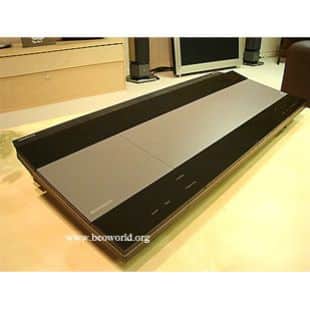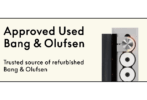
BeoCenter 8500
The mirrored exterior of aluminium and smoked glass gave no hint of the power hidden beneath the surface of Beocenter 9500. Central to the concept was the AM/FM receiver. On the flanks, CD player and cassette recorder awaited their turn in the spotlight. When they were needed, a light touch on the display panel was […]
Overview
The mirrored exterior of aluminium and smoked glass gave no hint of the power hidden beneath the surface of Beocenter 9500. Central to the concept was the AM/FM receiver. On the flanks, CD player and cassette recorder awaited their turn in the spotlight. When they were needed, a light touch on the display panel was all that was required to make lids glide to the side giving immediate access to disc or cassette. The Beocenter was designed by Jacob Jensen and was the direct descendant of Beocenter 9000. The two models features here were superceded in 1994 by Beocenter 9300.
Simple logical operation
A light touch directly on Beocenter 9500 was all you needed to access its operation. The illuminated display led you logically through the programming and other functions always showing you what to do next. This ease and simplicity of use was the first impression you obtained of the music system. And equally easy to use was the optional remote control Beolink 1000 terminal.
Entertainment and information from three reliable sources
You could preset up to 20 FM and AM stations on the Beocenter 9500 receiver. And when you made your choice, search and fine tuning were completely automatic. Also, you could preset the receiver to switch on automatically to catch the news, or perhaps a favourite serial at just the right time. If you were out, the cassette recorder could be programmed to record and you could play back at your leisure.
You could also use the Beocenter 9500 receiver as a guaranteed alarm. In the event of a power failure during the night, the clock instantly switched to its own built-in batteries to ensure that you awoke at just the right time.
The CD player which accommodated both 12cm and 8cm compact discs was also ready for your commands. It gave you instant access to a specific track anywhere on the disc and allowed you to change the order in which the tracks were played, or to simply choose only those tracks you wished to listen to. Technology at its most convenient best. When used with Beogram 9500 the music system was known as Beosystem 9500.
The fine art of control of Beocenter 8500 & 9500
The unfailing sensi-touch control of the Beocenter 9500 works through a condenser effect. A graphite area is printed on the underside of the glass panel, and charged with a high frequency current. Even the lightest touch of a finger will spark the reaction.
Beocenter 8500
For individuals who could live without time-programming but wanted the advanced features of the Beocenter 9500, Bang & Olufsen created the Beocenter 8500. There was no difference in the quality of the sound, but the cabinet was finished in a soft grey as an alternative to the polished aluminium finish of Beocenter 9500.
Product Details
Software
No software information available.
Product Specification
2506 (EU) (1989 – Feb 1994)
2507 (GB) (1989 – Dec 1993)
2510 (AUS) (1989 – Dec 1993)
2509 (J) (1989 – Dec 1993)
2508 (US) (1989 – Dec 1993)
Amplifier:
Long-term max. output power: IEC 2 x 80 watts / 8 ohms
Total harmonic distortion IHF: < 0.1 % & 30 watts 20 – 20,000 Hz
Dynamic headroom 1 dB: / 8 ohms
Intermodulation IHF: < 0.1 %
Bass control at 40 Hz: +/- 10 dB
Treble control at 12,500 Hz: +/- 8 dB
Tape recorder:
Compact cassette C46 – C120
Recording system HX PRO
Tape head Sendust
Wow and flutter DIN 64 dB, C: >73 dB
Chrome Dolby NR B:>65 dB, C: >74 dB
Ferro Dolby NR B:>63 dB, C: >72 dB
Power supply: 110 – 130 – 220 – 240 voltage switch
Power consumption Max. 200 W
Dimensions W x H x D 76 x 11 x 34cm
Weight 14 kg
Tuner:
FM range: 76 – 90 MHz (Type 2509, 2513)
87.5 – 108 MHz (Type 2506, 2508, 2510, 2511, 2512, 2514)
LW range 2506, 2511: 150 – 350 kHz
MW range 2506, 2508, 2509, 2510, 2511, 2512, 2513, 2514520 – 610 kHz
Compact disc player:
Frequency range 3 – 20,000 Hz +/- 0.3 dB
Signal-to-noise ratio > 100 dB / 110 dB A-weighted
Dynamic range > 96 dB
Harmonic distortion 0.0025 % at 0 dB
0.0025 % at -20 dB
Channel separation > 101 dB
Converter system 2 x 16 bit, 4 x oversampling
Low pass filter analogue Bessel
Connections: Beocord Tape 1 Built-in
Beocord Tape 2 7-pin DIN, Datalink
Beogram CD Built-in
Beogram LP 7-pin DIN, Datalink
BeoLab 2 x Power Link
Beovox 4-pin DIN
Beovision 7-pin DIN, Datalink
Link compatibility: Master Control Link
Downloads
Type | Language | Type Number | Type | |
Setup Guide | EN | BeoCenter 8500 Setup Guide | ||
User Guide | EN | BeoCenter 8500 User Guide | ||
Door Cord | Multi | BeoCenter 8500 Door Cord | ||
Service Manual | Multi | 2511, 2512, 2513, 2514 | BeoCenter 8500 Service Manual | |
Service Manual Corrections | Multi | BeoCenter 8500 Service Manual Corrections |
Photo Gallery
No gallery images.
Frequently Asked Questions
BeoCenter displays "CODE"
This usually happens if you have replaced the S/W or the lithium battery has been replaced or needs replacing.
Fix the battery or RAM and then:
- Using a BeoLink 1000/Beo4 press:1271
- After 3 seconds, disconnect the 9500 from the mains and then reconnect. - Done!






